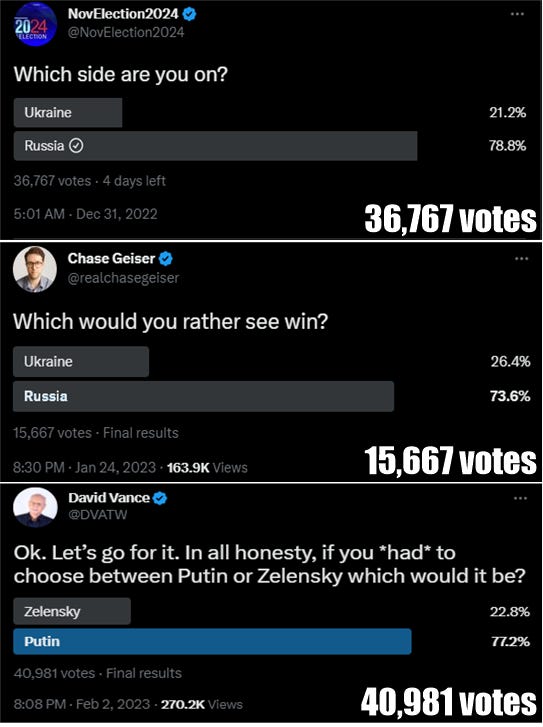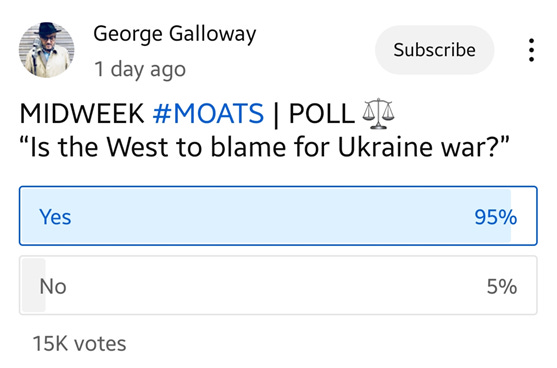This time it’s different: wisdom of crowds vs. western propaganda – Alex Krainer’s TrendCompass
Thu 8:04 pm +01:00, 23 Feb 2023The powers-that-be failed spectacularly on two mission-critical fronts

The “Wisdom of Crowds,” a hypothesis popularized by James Surowiecki in his 2005 book of the same title, is among the most fascinating discoveries about the collective human psychology. It’s an antithesis to Charles Mackay‘s “Extraordinary Popular Delusions and the Madness of Crowds.” In a nutshell, Surowiecky suggests that under certain conditions, the crowds can converge on the truth about some matter or zero in on most effective solutions to a problem more accurately and more reliably than even the best qualifie experts in that problem matter. I will skip the discussion of concrete cases of this mysterious phenomenon, but for all who are interested, I summarized two of Surowiecki’s most fascinating examples in my book “Mastering Uncertainty in Commodities Trading” (free download at link, you’ll find the relevant discussion on pages 58 and 59).
Social media are making us remarkably smart
But in order for the crowds to manifest such wisdom, a number of conditions must be satisfied: (1) the flow of information must be decentralized; (2) truthful information must be present within the information universe; (3) there has to be a wide diversity of participants in the discussion, and (4) the participants must not be dependent upon each other in making their judgments.
Modern social media may have created an environment where these conditions have satisfied in a robust way, which radically changed the way we respond to information as a collective. Until not so long ago, information flowed from centralized sources which filtered the information that reached the public. For as long as the society depended on the printed word, radio or TV for information, controlling the flow of information and shaping the narratives was relatively straightforward.
Spontaneous detoxing from Russophobia
The emergence of social media may have upended this quaint order of things, and the perfect example of this is the current conflict between Russia and the west. Over the past two decades, western legacy media have kept a tight control over the narrative about Russia and its leadership. Adversarial positioning toward Russia has been one of the western powers’ key policy priorities and the media coverage about Russia has been consistently negative.
When Vladimir Pozner commissioned a group of researchers to comb through the archives of the New York Times over a 3-year period from 2015 through 2017 and look up Russia-related articles, they found zero stories that mentioned Russia in any positive context. The same is probably true of other western media too. On a rare occasion when a positive story escapes the watchful eyes of the censors, such stories are soon deleted and memory-holed.
The narrative control went turbo-charged last year from the day Russia invaded Ukraine: western powers almost completely purged all Russian sources and applied heavy-handed censorship of pro-Russian views.
In light of all this, one would expect to encounter uniformly negative views about Russia in the west. How else should we perceive a nation with zero redeeming qualities, led by a thuggish kleptocracy under a President who is a former KGB agent? And now that this nation started an unprovoked, illegal aggression of a neighboring sovereign country, we’d expect Russia to arouse nothing but fear, loathing and hostility in the west. But that’s not what happened; it seems that such sentiments are limited to public officials and mainstream media, but are not generally shared among the public.
That didn’t go as planned
While it is true that Russia’s invasion of Ukraine caused shock and consternation among people in the west, the initial condemnation of Russia has largely dissipated. In Croatia, which is a catholic nation that’s never been particularly close with Russia, probably three out of four people sympathize with the Russian side. This has been my own impression, shared by many people I spoke with there. A number of informal polls I encountered on social media during the recent months corroborate this sentiment. Here are three examples that gained a relatively large number of votes on Twitter:

Neither of the three Twitter accounts that conducted these polls appear particularly pro-Russian, so the results should not be disregarded. I encountered another handful of polls, showing results that are similarly in discord with the mainstream narrative. Here’s today’s example, courtesy of George Galloway’s Mother of All Talk Shows (MOATS) poll on YouTube:

To be sure, these were not scientific polls. The participants could be from anywhere in the world including Russia, and the results might have been influenced by bots (in either direction, in fact). But I received another corroboration from a surprising source.
Populations in NATO nations not so keen on hating Russia
A few weeks ago I received an email from a person that works for NATO in one of its member nations. They told me that NATO was careful to monitor the public sentiment among its member states. Here’s what they wrote (word for word, including emphasis): “I know from my job (military) that Roumanians, Moldovans, Bulgarians, Hungarians, Slovakians, Cypriots and all the Balkans are circa 3 out of 4 and above with Russia. Austrians, Italians, Czechs, Spaniards and French around 2 out of 3.”
All but the George Galloway’s YouTube poll predate Seymour Hersh’s recent article which points at the Biden Administration as the culprits behind last September’s attacks on Nord Stream pipelines. This bombshell would certainly have moved the sentiment further in Russia’s favor.
This time it really IS different
What we are looking at, in fact, is a massive narrative control failure by the western powers. Maintaining control of the narrative is not just an auxiliary luxury in politics. It is an essential requirement for successful policy conduct and as such it justifies enormous expenditure of resources in formulating the narrative, controlling the information flows and censoring dissenting views. The ruling elites parasites lavishly fund hundreds of think tanks to manufacture the materials with which to contrive compelling narratives and shape public perception.
They have perfected their game with over two centuries’ worth of experience and know-how in the arts of manipulating public opinion. Yet in the last three years we saw them fail spectacularly on two critically important fronts: (1) in their confrontation with Russia and (2) in their attempt to corral us into a dystopian “New Normal” on the back of the Covid 19 pandemic.
They failed because the way we collectively process information, learn and make decisions has changed radically and probably for good. All this should inspire a new faith in humanity and represent compelling grounds for optimism about our future. These changes are also of utmost relevance in the domain of investment speculation, because they’ll impact the price discovery process in ways we can’t yet account for. Whatever might have been the norm over the last decades may have become obsolete as a guidepost for the future.
However, markets wll continue to move in trends and with high quality trend following strategies investors will be able to navigate the coming changes and prosper until we can replace the current monetary system with honest money and the whole business of investment speculation becomes unnecessary.


